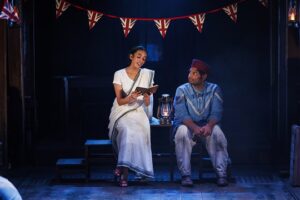Jessica Harris explores a tale of empire at the RSC.
Staged within an immense halo of ever-changing colours, this is a story about empire, and specifically about the experiences of people who travelled from India to Britain during the latter part of Queen Victoria’s reign.
Through a mix of historical and fictional characters, The Empress reveals London as a place with a significant Indian population long before the migrations of the 1950s and 60s. It tells of their reasons for travelling, whether for work, for education or to make change happen. And it tells of the contradictions between expectations and reality.
Tanika Gupta’s text pulls few punches in its critique of colonialism, and of the resolve of those in power not to concede to others. At a time when Indian people were seen as chattels, Rani, a 16 year-old Bengali ayah, is full of enquiry, hope and determination, whilst Abdul Karim is also looking to his future. When their boat docks at Tilbury, Rani is sacked by her employer who prefers to use an English nanny, whilst Abdul is given as a gift to Queen Victoria, and so becomes her servant.
Double-speak becomes an art form in the hands of those whose every instinct is to protect their authority. Rani’s employer tells her that she is being given her freedom. In reality, she is destitute in a foreign country. Queen Victoria, interested in the cultures and faiths of India, and in challenging racial prejudice, raises Abdul from the status of servant to teacher. Nonetheless, she sacrifices him when her own authority is under threat.

Beyond this, a wider picture of exploitation and violence is painted. Through the mouth of Hari, a lascar, we hear of the cruelty with which these Indian crew members were treated whilst, through the words of Dadabhai Naoroji, the first Indian member of the UK parliament, we hear that the entire might of the British army is being pitted against a handful of Boer farmers, and that India has been left to suffer mass famine without help from its British rulers.
The production’s use of tiered staging and lighting effects underpins the text, conveying lingering images of the imbalance of power. The pregnant Rani is shown in silhouette, cast out and alone. As Abdul falls from grace, his adversary Lady Sarah, stands high on a platform. Below, his medals are removed and his correspondence with the queen is burned.
In contrast, hope for the future is affirmed: the moment of the departure of Dadabhai and Abdul, who have sought to influence systemically but are now returning to India to continue their fight in different ways, is held for a while, as a backdrop to activity downstage.
The Empress is more about the intersection of ethnicity, class, gender and religion, than it is about exploration of character. And so, despite their different view-points and degrees of authority, the relationship between Queen Victoria and Lady Sarah does not delve into areas of ambiguity. Similarly, there is little ambivalence in Rani’s relationship with her various employers, who abuse her and then dismiss her, despite the love she has built with their children.
Yet, the production works. Stylised performances convey that, beyond what we see on stage, there is a bigger picture of empire and dominance. And there are moments where the individuality of characters shines through. Firoza, an ayah with forty sea crossings to her name, challenges the stereotypes in her playful mocking of Christian patrons who have set up a home for abandoned ayahs. The relationship between the Queen and Abdul takes on a new depth as he describes to her the wonder of the Taj Mahal.
And there are moments of celebration of India. Abdul’s description of the Taj Mahal to Victoria is just a forerunner to his conjuring up sights, sounds and dancing of the country. There is humour too: whilst ayahs and lascars use exaggerated signs of subservience and accentuated accents in their contact with the British upper classes, in their own company they speak without accent, and connect with laughter and exuberance.
With a strong cast, effective direction and a clear sense of artistry, The Empress is well worth seeing before it transfers to London. Rani is played by Tanya Katyal, Abdul by Raj Bajaj and Queen Victoria by Alexandra Gilbreath. It was written by Tanika Gupta, and directed by Pooja Ghai.
For further information visit rsc.org.uk
Pics – Ellie Kurttz (c) RSC.


